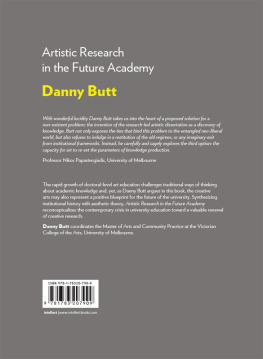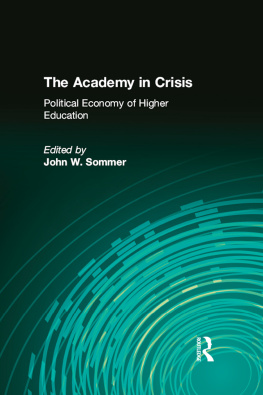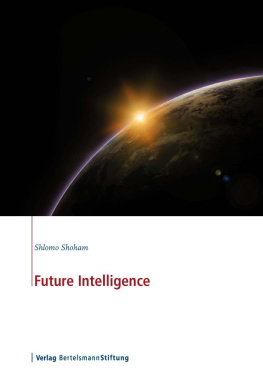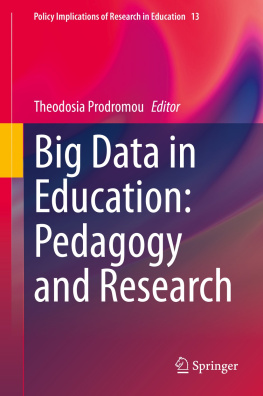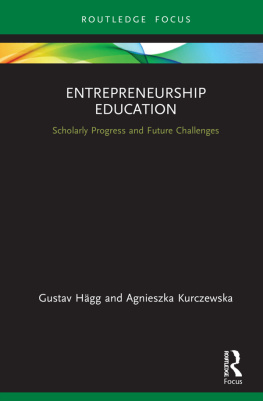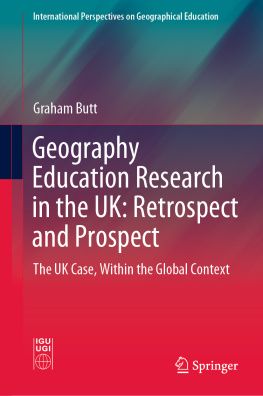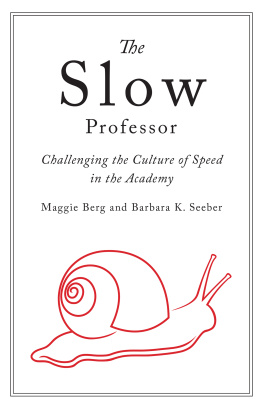

First published in the UK in 2017 by
Intellect, The Mill, Parnall Road, Fishponds, Bristol, BS16 3JG, UK
First published in the USA in 2017 by
Intellect, The University of Chicago Press, 1427 E. 60th Street,
Chicago, IL 60637, USA
Copyright 2017 Intellect Ltd
All rights reserved. No part of this publication may be reproduced, stored in a retrieval system, or transmitted, in any form or by
any means, electronic, mechanical, photocopying, recording, or otherwise, without written permission.
A catalogue record for this book is available from the
British Library.
Cover designer: Alex Szalbot
Copy-editor: MPS Technologies
Production manager: Richard Kerr
Typesetting: Contentra Technologies
Print ISBN: 978-1-78320-790-9
ePDF ISBN: 978-1-78320-791-6
ePUB ISBN: 978-1-78320-792-3
Printed and bound by Gomer Press Ltd, UK.
Researching this book over the last decade has solidified its grounding principle: knowledge only transpires in communities of support, and behind the authorial signature of every creative effort lies a specific and extensive social world. In this case, I too owe many people a range of debts that cannot be repaid or fully acknowledged.
The research underpinning the early chapters of the book was undertaken as doctoral study at the University of Melbourne, under the supervision of Sean Cubitt and Scott McQuire, who have been sensitive readers and fine examples of the lineage of interdisciplinary critical work I hope to continue. The book was finished with the assistance of an Early Career Research Fellowship at the Research Unit in Public Cultures at the University of Melbourne, under the direction of Nikos Papastergiadis. All three have inspired with their support for younger scholars and their commitment to institutional battles that allow such care to be made meaningful. Suneel Jethani, Audrey Yue, Alison Young, Peter Rush, Meredith Martin, Robert Hassan, Robbie Fordyce, Tom Apperley, Dan Edwards and Daniella Trimboli have all provided important support at the university in different ways.
The Centre for Cultural Partnerships (CCP) at Victorian College of the Arts, and The Elam School of Fine Arts at the University of Auckland provided venues where research into the university-based art school has been grounded in my own teaching and supervision. At CCP I enjoyed the leadership and collegiality of Lachlan MacDowall, James Oliver, Marnie Badham and Dean Merlino, all of whom galvanised the political commitments of this book. In the broader VCA the support of Su Baker, Barb Bolt and Richard Frankland has made the institution seem humanisable and thinkable. At Elam, Jon Bywater has led a critical studies programme of vision and integrity. Departmental heads Derrick Cherrie, Nuala Gregory, and the late Jonathan Mane-Wheoki at Elam and Jon Cattapan at VCA provided valuable support. At both venues, Tania Caas, Luli Eshraghi, Jen Rae, Amy Spiers, Taarati Taiaroa, Anna Gardner, Shannon Te Ao, Karena Way, John Ward-Knox, and Cat Auburn have been fantastic co-teachers and fine artist-academics in their own right from whom I learned a lot. Conversations with all the faculty and students have been important for this project. Time teaching in the Department of Media Arts at Waikato Institute of Technology, and a residency at the Centre for Media Research, University of Ulster organised by Ned Rossiter were also important to the genesis of this project.
An ongoing collaboration with Rachel OReilly has specifically shaped the argument in the latter chapters, and from her engagement I am continually challenged to reassess my own thinking and writing. Abbra Kotlarczyk worked with me on the developmental editing of the text, and her sharp eye for what makes the historical relevant in the contemporary was critical to the book achieving its final form. Thanks are also due to Jessica Mitchell and Richard Kerr at Intellect for their care and support for the book.
Robert Hutchinson, my partner at Suma Media Consulting, and Claude-Yves Charron, former Secretary-General of ORBICOM, have been central to my understanding of institutional dynamics in ways that cannot be academically cited, but have been central to the project.
Too many collaborators to mention here have shaped the intellectual work of this book. Particular thanks are due to my MA thesis supervisors 20002005, McKenzie Wark and Graham Meikle. The Fibreculture group provided my first home for critical writing as an academic, and a schooling in collaborative work during this period. The members of the Intranation residency at Banff Centre for the Arts, especially collaborators Hemi McGregor and Natalie Robertson and advisors Ashok Mathur and Shirley Bear, provided an initial insight into the potential for creative enquiry within the colonial frame. Leora Farber at the University of Johannesburg invited me to Africa for the first time, where many threads in this research were clarified. Conversations with Huhana Smith, Luke Willis Thompson, David Haines, Joyce Hinterding, Sarah Waterson, Charlie Sofo and David Hatcher sharpened my sense of the issues at stake later in the project. Along with fellow organisers Jon Bywater and Nova Paul, participants in the Cultural Futures symposium (2005) at Hoani Waititi deepened my understanding of and connection to the specific currents underlying artistic practices in the Asia Pacific region: thanks go to Albert Refiti and Lemi Ponifasio; Amanda McDonald Crowley; Cheryl LHirondelle; Charles Koroneho; Creative Combat; Fatima Lasay; Jenny Fraser; Lisa Reihana; Rachael Rakena; and Raqs Media Collective. Raqs, along with Gayatri Chakravorty Spivak, have provided both generous hospitality and inspirational models for practice. Acknowledgements are also due to Lauren Berlant, Robert Nelson and David Garcia for their generosity and example.
A number of people provided their homes and venues for writing particular thanks are due to Xavier and Carolyna Hart-Meade; Edwin and Ivy DeSouza; Bev and Ian Robertson; Jim and Velda Berghan; and Mick and Coco Butt, who also introduced me to Pulau Banyak, Aceh where much of this work was completed. Acknowledgements are also due to the Boon Wurrung, Wurundjeri, Ngti Whtua and Tainui peoples on whose lands I have lived while undertaking this project. My parents, Les, Rhonda, Val, and Peter, have always provided love, encouragement, and support.
The other members of the Local Time collective (Jon Bywater, Alex Monteith, Natalie Robertson) have taught me that work is both more rewarding and more exacting with long-term collaborators. The book is dedicated to them and the whole Omaewa whanau, in support of a kaupapa that makes all institutional constraints seem available for transformation.
Finally, for Ruth DeSouza, without condition or reserve.
Parts of the Introduction have appeared in The Art of the Exegesis, Mute (2012) and Theses on Art and Knowledge, un Magazine 7.1 (2013). Other sections of the book have appeared in Whose knowledge? Practice-led research after colonial science in On Making: Integrating Approaches to Practice-Led Research in Art and Design (2010) edited by Leora Farber, and Neo-liberal and future universities, in the zine We are the University, published to accompany the Nationwide Day of Student Action, University of Auckland, 26 September 2011.
A t the end of the eighteenth century, Nazarene painter Eberhard Wachter rejected a position on the staff of the Stuttgart Academy, noting that there is too much misery in art already; I do not want to increase it. Yet, since the integration of art schools into the university sector and the rise of creative practice Ph.D.s and other research degrees, the need to define problems to satisfy a demand for academic rigour has become a problem of its own.
Next page
